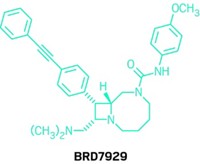Advertisement
Grab your lab coat. Let's get started
Welcome!
Welcome!
Create an account below to get 6 C&EN articles per month, receive newsletters and more - all free.
It seems this is your first time logging in online. Please enter the following information to continue.
As an ACS member you automatically get access to this site. All we need is few more details to create your reading experience.
Not you? Sign in with a different account.
Not you? Sign in with a different account.
ERROR 1
ERROR 1
ERROR 2
ERROR 2
ERROR 2
ERROR 2
ERROR 2
Password and Confirm password must match.
If you have an ACS member number, please enter it here so we can link this account to your membership. (optional)
ERROR 2
ACS values your privacy. By submitting your information, you are gaining access to C&EN and subscribing to our weekly newsletter. We use the information you provide to make your reading experience better, and we will never sell your data to third party members.
Infectious disease
Covid-19
Artemisinin raises hopes and fears amid COVID-19
Researchers test Artemisia annua extracts against the novel coronavirus, while the WHO cautions that herbal remedies made from the plant could boost malaria resistance
by Mark Peplow, special to C&EN
May 27, 2020
| A version of this story appeared in
Volume 98, Issue 21

As the world desperately searches for weapons to fight the COVID-19 pandemic, a growing number of people are turning to an herbal remedy: Artemisia annua. The sweet wormwood plant supplies a key ingredient, artemisinin, for so-called artemisinin-based combination therapies (ACTs), which the World Health Organization (WHO) recommends as first-line treatments against malaria.
One of the most high-profile advocates for using the herbal remedy against the novel coronavirus is Madagascar president Andry Rajoelina, who has been touting Covid-Organics, a tonic containing A. annua that the Malagasy Institute of Applied Research developed. In May, he claimed that more than 20 other African countries had ordered supplies of the elixir.
But health officials are deeply concerned about the promotion and use of these herbal remedies for three principal reasons. First, no evidence exists that A. annua extracts can prevent or cure COVID-19. Not only does that claim give users false hope, it may also foster a false sense of security and lead them to flout public health guidelines such as social distancing and handwashing.
Support nonprofit science journalism
C&EN has made this story and all of its coverage of the coronavirus epidemic freely available during the outbreak to keep the public informed. To support us:
Donate Join Subscribe
Second, A. annua preparations such as teas, tonics, or herbal capsules also contain a cocktail of bioactive compounds in addition to artemisinin that can have side effects such as dizziness, hearing problems, and vomiting.
Third, and perhaps most worrying of all, widespread use of A. annua herbal extracts could bolster drug-resistant strains of malaria parasites such as Plasmodium falciparum. For people living in regions where malaria is endemic, exposure to subtherapeutic doses of artemisinin in A. annua may be enough to kill off some of the parasites in their bodies, but not all of them. Clearing out weakling parasites leaves more room for drug-resistant siblings to proliferate, rendering vital ACTs ineffective. “It’s kind of a Darwinian effect,” says Karen I. Barnes of the University of Cape Town, who leads the Collaborating Centre for Optimising Antimalarial Therapy.
In October 2019, the WHO published a major review on these nonpharmaceutical forms of artemisinin, which concluded that “widespread use of Artemisia annua herbal remedies could hasten the development and spread of artemisinin resistance.” Roughly 90% of global malaria cases are in Africa, where A. annua herbal remedies are readily available as teas and capsules.
Artemisinin resistance is already a big problem in Southeast Asia, where 80–90% of parasites have a mutation that enables them to survive treatment with ACTs, says Pascal Ringwald, who leads the drug resistance and response unit of the WHO Global Malaria Program. Signs of rising resistance have also appeared in Rwanda, Guyana, and Papua New Guinea.
There is significant concern about ACTs being rendered useless, says Dyann F. Wirth, a malaria researcher at Harvard University. “If we lose this drug, the malaria deaths will go way back up because there’s nothing that’s immediately available to replace it.”
Testing times
Still, some aren’t willing to give up on A. annua as a source of COVID-19 treatments. In April, California biotech company Mateon Therapeutics announced in a press release that tests showed artemisinin inhibited the replication of SARS-CoV-2, the novel coronavirus that causes COVID-19. Artemisinin and its derivative artesunate are also among a range of compounds being screened against the virus at the Liverpool School of Tropical Medicine, which expects to have results in a couple of weeks.

And a consortium of researchers in Germany and Denmark is testing whether artemisinin derivatives and A. annua plant extracts can prevent SARS-CoV-2 from infecting human cells. “There is some evidence in the literature that these things have potential antiviral properties,” says Kerry Gilmore of the Max Planck Institute of Colloids and Interfaces, who is part of that consortium. For example, in 2005, researchers in China found that A. annua extracts had some activity against SARS-CoV, the coronavirus that caused the severe acute respiratory syndrome (SARS) outbreak in 2002–3 (Antiviral Res., DOI: 10.1016/j.antiviral.2005.02.007). However, researchers have not identified the active compounds that might be responsible for this effect or determined their mechanism of action against that coronavirus.
When countering malaria, artemisinin exploits the parasite’s taste for hemoglobin in its host’s blood. As the parasite digests hemoglobin, it frees the iron-porphyrin heme complex from the protein. Because this heme is toxic to the parasite, the organism normally converts the complex to a more benign crystalline form. “But artemisinin corrupts this heme-detoxification pathway,” says Paul O’Neill, a medicinal chemist at the University of Liverpool.
If artemisinin does have any effect against SARS-CoV-2, though, it likely relies on a completely different mechanism than the one it uses against the malaria parasite, Harvard’s Wirth says.
Herbal blends
Gilmore and his Max Planck colleague Peter H. Seeberger have a long history of working with A. annua. The duo had previously developed a flow photochemistry system to increase the yield of artemisinin that can be extracted from the plant. The researchers set up a spin-out company called ArtemiFlow to develop the technology, in collaboration with the Kentucky Tobacco Research & Development Center in the US, where the company has cultivated several acres of the crop. A few months ago, Gilmore set up a sister company, ArtemiLife, which supplied A. annua for the Germany-Denmark consortium’s cell studies.
Gilmore says that ArtemiFlow has struggled to raise enough funding to scale up its flow photochemistry system. So ArtemiLife is also marketing A. annua herbal tea and coffee directly to consumers, potentially providing an income stream that could support the team’s research. “If we can fund this ourselves, by our own products, then we don’t have to worry about other people’s agendas or motivations,” Gilmore says.
ArtemiLife is careful to note that its tea and coffee are “not intended to diagnose, treat, cure or prevent any disease” and cautions that common side effects may include hearing loss and liver problems. But it also claims that drinking two servings per day will help consumers “maintain an active shield,” thus “protecting your well-being.” The firm’s coffee contains 0.4 g A. annua per serving, and its tea 0.23 g. The dried leaves of A. annua typically contain around 1% artemisinin, so consuming the drinks would offer much lower doses than typical ACTs, which deliver hundreds of milligrams of artemisinin derivatives per day.
Gilmore directed C&EN to artemisiaannua.org, a website launched in March, for further information. It claims “a powerful body of scientific evidence, built over the last 40 years, has revealed that the components in the leaves of Artemisia annua are highly active against a broad range of human diseases, including viruses, parasites, and cancers.”
The site contains no explicit link to ArtemiLife. But it’s and ArtemiLife’s websites are connected to the same Google Analytics account, and the name of ArtemiLife’s CEO, Adam Maust, appeared as an author in the source code for artemisiaannua.org.
“It seems like a sneaky way of making medicinal claims and hoping not to get caught,” the University of Cape Town’s Barnes says.
Gilmore strongly denies any subterfuge. Although he provided information for artemisiaannua.org, it “is not linked officially to ArtemiLife,” he says. Gilmore acknowledges that herbal products containing A. annua do carry a risk of promoting artemisinin resistance but notes that ArtemiLife is initially planning to sell its products only within the US. Scientists interviewed by C&EN agree that although this use is against WHO recommendations, it does not risk accelerating resistance because there are so few cases of malaria in the US.
Still, ArtemiLife has solicited expressions of interest from customers around the world with the hope of expanding into other markets. Selling these herbal products in malaria-endemic regions “would be a problem, definitely,” WHO’s Ringwald says.
Assuming artemisinin did successfully make the long journey through cell tests, animal tests, and clinical trials against COVID-19, using it to beat the coronavirus would still present a serious quandary. “We must bear in mind that the collateral effect could be development of artemisinin resistance, if it is used at a very large scale against coronavirus,” Ringwald says.
Over 5 million cases of COVID-19 have been recorded around the world, causing more than 350,000 deaths as of May 27. “COVID-19 is horrible,” Wirth says, “but I try to remind everybody that every year there are over 200 million cases of malaria around the world and almost half a million deaths.”
Mark Peplow is a freelance science writer based in the UK.





Join the conversation
Contact the reporter
Submit a Letter to the Editor for publication
Engage with us on Twitter